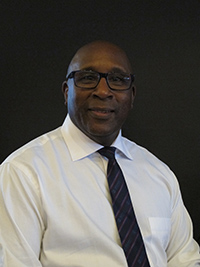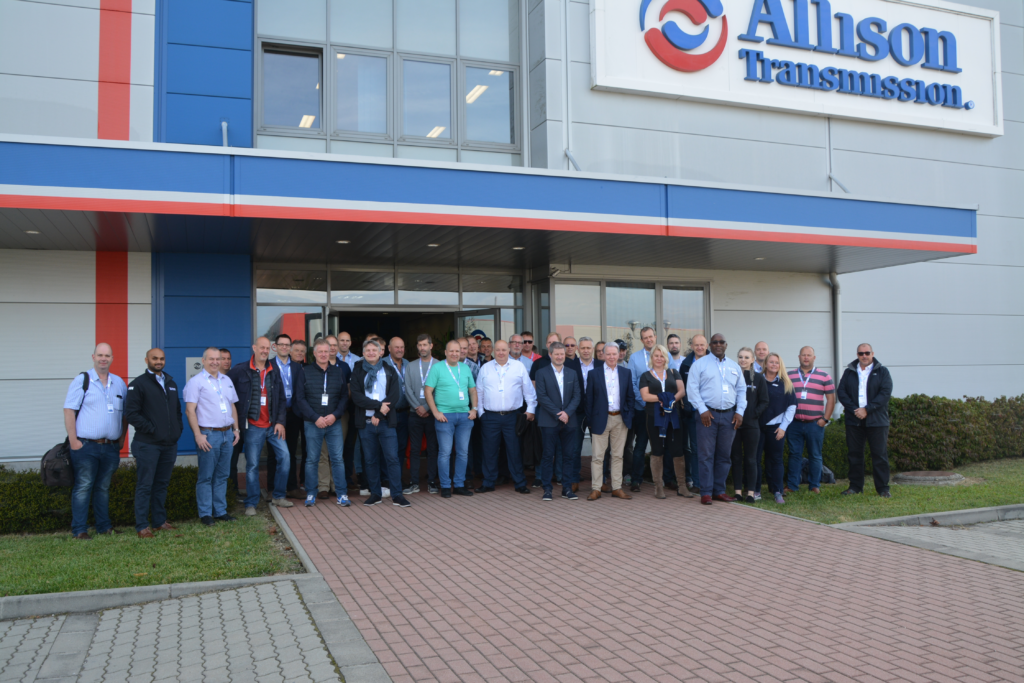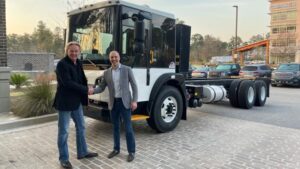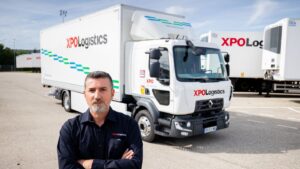Improving the diversity and inclusivity of the fleet industry is essential if the sector is to remain innovative and dynamic as we move into the next decade, Nathan Wilson from Allison Transmission tells Fleet Vision International. Words by Ann-Marie Knegt.

Nathan has been a familiar face in the fleet management sector for many years. After a distinguished career working for OEMs, he is now Account and Market Development Manager for Allison Transmission Europe for the UK and Ireland markets. Nathan wants to inspire people to join a rewarding industry that desperately needs new talent, from drivers and technicians to workshop and logistical specialists all the way up to senior executive leaders. He believes a lack of diversity can be a self-perpetuating barrier to entry.
‘Simply put, if you don’t see anyone representing the industry who looks like you, you will not be encouraged to join that particular sector. And, without diversity, the industry will not maximise its pool of candidates, flourish, or expand.’
Nathan’s industry journey started in the late 1970s. He had a keen interest in heavy machinery, including trucks and buses, and applied for a job with a major haulage company when he left school. When Nathan didn’t hear back, he went into the office and managed to convince the transport manager that taking him on was an excellent idea.
‘It proved to be right for both parties because I was enrolled on a five-year apprenticeship. I could not have dreamed of a better start to my career. Firstly, the company sent me to college. As the only apprentice, I had the chance to work with skilled technicians and diesel fitters, so I learnt so much from them. I also attended many manufacturers’ training courses delivered by the OEMs − unheard of at the time.’
Importance of apprenticeships
Nathan says the nature of the job has changed beyond recognition in recent years. Commercial vehicle technology has become extremely advanced with CANbus-based telematics, in-vehicle diagnostics, and advanced electronic systems.
‘Vehicle maintenance is no longer just a dirty, greasy job. Nor is an admin role just a subordinate for making the tea or coffee. The industry has become very sophisticated. Joining a company as an admin trainee or as a commercial vehicle apprentice is a great stepping stone to a limitless career path.’
The industry is dealing with a major driver and mechanic shortage. Instead of an obstacle, could this instead be used as an opportunity to attract people who would not normally consider a career in transport or fleet?
Nathan says there has been an increase in the number of people from ethnic minorities applying for driver roles, particularly during the explosion of online ordering caused by Covid-19. However, he feels that these new industry entrants don’t see management roles opportunities because there is hardly any representation at this level.
‘Many people from a BAME background will not aim higher in their careers because they don’t see individuals who look like them in senior management. This perception makes them unlikely to further their skillset towards a management role.’
Nathan believes that broadening the net is essential. ‘People of colour, the young, women – everyone needs to see that there is a route to the top, a career path they can follow. It is a chicken and egg situation because most people only apply for vacancies where they see representation.’
Then there’s competition from other sectors. ‘We need to up our game as an industry and show people there is more to life than becoming an influencer on Instagram, a model or a footballer. We need to demonstrate that a career in our trade can add value to the wider society while enhancing personal life experiences. A position managing a workshop does not sound very attractive, so we need to communicate that this is now a very sophisticated responsibility.’
The pandemic has hammered home how commercial vehicles, logistics, and fleet management are crucial to keeping society going. ‘Now is the time,’ Nathan suggests, ‘to raise awareness of the many different fleet and logistics roles, from technicians and drivers to data analysts, administrators, and directors.
‘We need to demonstrate that there are career paths for people from any background. However, it is equally important to manage expectations. No one starts as the captain. There is a learning period for everyone entering a new career, of widening skills and continuous development. This path takes many years. There are no short-cuts to success, and if it seems so, it is probably not real success.’
Visualisation
During his career, Nathan worked hard to learn his craft and the skills that come from progressing through the ranks. ‘I started at the bottom, but when I saw a manager in a suit, I visualised myself in that outfit with that brown leather briefcase. My role model, who worked at MAN Truck & Bus UK, was highly articulate, with lots of technical and business knowledge. He had the understanding of a successful businessperson. Whenever he came to visit our facility, I would rush over to speak to him. He started at the bottom and he told me that when you stop learning, you stop earning. This has always stayed with me. So, after college, I eventually went to University, where I completed a post graduate training course (MSc) in Automotive Retail Strategy.’
Nathan became proficient in marketing, business concepts, accountancy and management processes. Hyundai, his employer at the time, funded the degree and Nathan says he will be forever grateful for that opportunity.
‘Before that, I was fortunate enough to work in the Truck Division of Mercedes-Benz UK, then I helped set up the MB Bus and Coach Division HQ in Coventry. I then headed up the fleet team. Now, I am employed by the global transmission and propulsion solution provider Allison Transmission Europe, and continuous learning is a continuing theme here.’
Nathan has travelled the world for work, another opportunity that needs to be conveyed to the next generation of the sector workforce. Employers need to think creatively to find new people, to cast their net more widely, and promote the opportunities and benefits in a more effective, innovative, and coherent manner. They need to break down the barriers that make people of colour, young adults, and women feel that they cannot apply for a fleet and logistics career. The benefits will be felt by organisations and the sector as a whole. ‘Diversity will help businesses expand and grow. Different points of view enhance organisations; they don’t hinder them. It’s time to reach out to those who would not otherwise apply and give them a reason to step up.’




